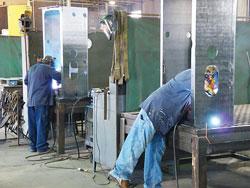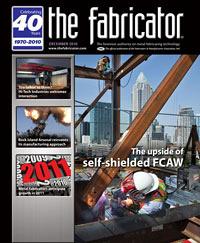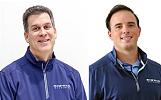Senior Editor
- FMA
- The Fabricator
- FABTECH
- Canadian Metalworking
Categories
- Additive Manufacturing
- Aluminum Welding
- Arc Welding
- Assembly and Joining
- Automation and Robotics
- Bending and Forming
- Consumables
- Cutting and Weld Prep
- Electric Vehicles
- En Español
- Finishing
- Hydroforming
- Laser Cutting
- Laser Welding
- Machining
- Manufacturing Software
- Materials Handling
- Metals/Materials
- Oxyfuel Cutting
- Plasma Cutting
- Power Tools
- Punching and Other Holemaking
- Roll Forming
- Safety
- Sawing
- Shearing
- Shop Management
- Testing and Measuring
- Tube and Pipe Fabrication
- Tube and Pipe Production
- Waterjet Cutting
Industry Directory
Webcasts
Podcasts
FAB 40
Advertise
Subscribe
Account Login
Search
Same building, new people, new business
New job shop on the growth path
- By Tim Heston
- September 13, 2011
- Article
- Shop Management

Workers weld components at Avery Barron Industries, a Tulsa, Okla., contract fabricator that launched in July.
Kyle Whiteis knows what a late order can do to a manufacturing operation. Previously with Auto Crane Co. in Tulsa, Okla., he remembers walking by crane assemblies, some costing well into the six figures, that had been sitting on the manufacturing floor for far too long. The OEM was shipping late because of a few small, missing parts outsourced to contract fabricators.
Today Whiteis is vice president of a start-up fabrication job shop, Tulsa-based Avery Barron Industries (ABI). The company produces products for the oil and gas industry, specialty trucking, and other sectors. Whiteis keeps those previous bad experiences top of mind. High quality and on-time delivery are musts these days. Shops that don’t deliver on promises suffer, and as the recent recession proved all too clearly, the free market takes no prisoners. In fact, Whiteis is reminded of that every day he comes to work. ABI was born after the founders acquired the building and equipment of a now-defunct job shop.
Three veterans of Auto Crane Co., which was consolidated into its parent firm, Ramsey Winch Co., as part of bankruptcy reorganization, launched the business mainly because of those bad experiences. They saw a need. The world still needs quality metal fabricated components, fast and for a good price. It’s a tried-and-true mission, one that, at least from a financial perspective, made the business launch somewhat straightforward. Bankers liked what they saw.
“Finding capital went remarkably smoothly,” Whiteis said. “That was the easy part, actually.” Finding the right location and assets was the challenging part. “But once that presented itself, finding capital [to acquire the previous shop’s assets] was relatively straightforward.”
Whiteis and John Boettcher are ABI vice presidents, and Bruce Barron is president. (Avery is the middle name of Barron’s daughter, hence the company moniker.) Through the years the three gained experience at lean manufacturing, Six Sigma, and other continuous improvement techniques, and they immediately applied them when moving into their 50,000-square-foot facility in July. They moved machine tools to ensure more efficient part flow, organized workstations, and instilled a waste-elimination culture.
The company launched with six employees; now it employs a dozen. Whiteis said he expects ABI to become a $25 million firm that employs more than 100 within five years. To get there managers are focusing on several growth strategies. One is to take advantage of timing. Launching just after the recession, ABI began operating during a time of transition. Some local job shops—including the one that previously occupied ABI’s facility—didn’t survive, so some manufacturers in the region need new suppliers.
“Our timing is very good,” Whiteis said. “The response from the local market and even the broader regional market has been very positive. We’re finding that many purchasing managers are happy to see there’s another outlet.”
Quality parts and short lead-times have mass appeal for customers, some of whom are outside the Tulsa region. In fact, the young shop’s second-largest customer is more than a thousand miles away in Casper, Wyo. ABI fabricates pipeline baffles for the Wyoming firm, and since the job shop landed that contract several months ago, such baffles have become one of ABI’s signature products.
As Whiteis recalled, “We were able to bring on one of the salespeople from [the previous job shop], and he had an established relationship with these companies. He knew whom to talk to, and he communicated to them that this was a totally new business with new people and a new capital structure, even though we’re producing parts in the same facility.”
Managers said they’re hoping to grow by working with two sets of customers. First, the shop is working with some of the old job shop’s customers. These established relationships are straightforward. Customers send a request for quote, and ABI returns one.
But the second set of customers is different. The entrepreneurs are leveraging some of the relationships fostered during their days at Auto Crane Co. For instance, ABI now does work for one of Auto Crane’s truck equipment distributors that needed low-volume or one-off tank components for outfitting oilfield trucks. In these cases, ABI offers design services, showing new and potential customers how the company can lower costs.
As Whiteis put it, “For these customers, we can say, ‘Thanks for the sketch on the napkin. That helps us get started. Now here’s how we think we can design that component to lower your costs and to help you on the installation end as well.’”
Just because there’s a new player on the block doesn’t mean companies are automatically throwing million-dollar orders ABI’s way. “We’re being tested,” Whiteis said, explaining that the company started out mostly with very small orders, but larger orders are now coming in the door.
ABI’s business launched with a trickle of work; today it’s a stream, and in several years managers are hoping for a river. Of course, companies have to start from somewhere. Whiteis recalled a check the company received for an extremely small job, one of the company’s first. It was for $219. But the company fabricated the one-off product quickly, surpassed the customer’s quality expectation, and delivered on time.
“We received a small order, and we did exactly what we told the customer we would do,” Whiteis said. “A week and a half later, we had an order for $20,000.”
Sure, ABI’s facility in Tulsa has a checkered past. The company works with the same equipment the building’s previous occupant used: a laser cutting center, plasma cutting center, CNC press brakes up to 175 tons, a turret punch press, shears, flat-part deburring machine, blasting, paint shop, rollers, machining cells, and welding equipment. And the company hasn’t purchased any new equipment yet. In fact, the only thing tangibly “new” at ABI is the people.
Judging by the shop’s recent growth, though, people have made a big difference.
About the Author

Tim Heston
2135 Point Blvd
Elgin, IL 60123
815-381-1314
Tim Heston, The Fabricator's senior editor, has covered the metal fabrication industry since 1998, starting his career at the American Welding Society's Welding Journal. Since then he has covered the full range of metal fabrication processes, from stamping, bending, and cutting to grinding and polishing. He joined The Fabricator's staff in October 2007.
subscribe now

The Fabricator is North America's leading magazine for the metal forming and fabricating industry. The magazine delivers the news, technical articles, and case histories that enable fabricators to do their jobs more efficiently. The Fabricator has served the industry since 1970.
start your free subscription- Stay connected from anywhere

Easily access valuable industry resources now with full access to the digital edition of The Fabricator.

Easily access valuable industry resources now with full access to the digital edition of The Welder.

Easily access valuable industry resources now with full access to the digital edition of The Tube and Pipe Journal.
- Podcasting
- Podcast:
- The Fabricator Podcast
- Published:
- 04/16/2024
- Running Time:
- 63:29
In this episode of The Fabricator Podcast, Caleb Chamberlain, co-founder and CEO of OSH Cut, discusses his company’s...
- Industry Events
16th Annual Safety Conference
- April 30 - May 1, 2024
- Elgin,
Pipe and Tube Conference
- May 21 - 22, 2024
- Omaha, NE
World-Class Roll Forming Workshop
- June 5 - 6, 2024
- Louisville, KY
Advanced Laser Application Workshop
- June 25 - 27, 2024
- Novi, MI































